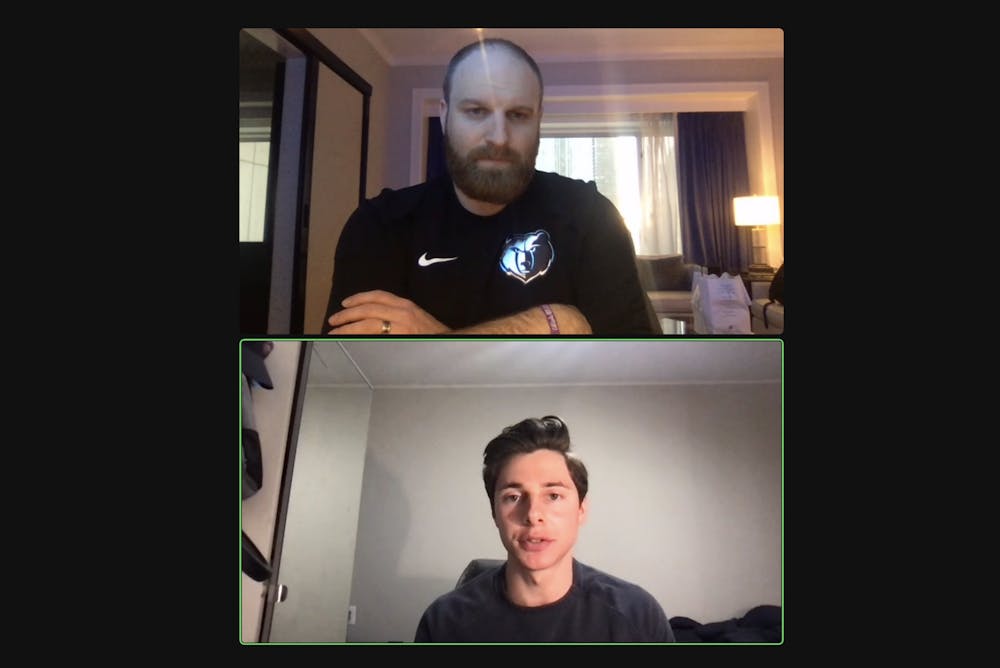The torchlight of the Grit ‘n Grind era of the Memphis Grizzlies has successfully been passed.
After just an hour of listening to coach Taylor Jenkins inspire current Penn students on a Zoom call, it’s hard to imagine how someone like Jenkins could have ever failed.
Jenkins — the third-youngest coach in the NBA — is currently the head coach of the Memphis Grizzlies — the second youngest roster in the NBA — and together, the Grizzlies are ascending as one of the league’s best teams.
Despite his job on basketball’s biggest stage, each year Jenkins takes the time to speak with Penn students at meetings hosted by the Wharton Undergraduate Sports Business Club, which occurred yet again on Friday, Feb. 25 over Zoom.
Jenkins’ storybook journey in the NBA began on the same day he graduated from Wharton in 2007 when he received a call to begin a year-long front-office internship with the San Antonio Spurs. After a short stint working in the front office, he developed a rapport with the current head coach of the Utah Jazz Quin Snyder.
Snyder was the D-League coach of the Austin Spurs at the time, and Jenkins shocked the organization by claiming he was interested in moving from the front-office to a coaching role.
But even during his time in college, Jenkins knew that he wanted to be a teacher. Jenkins and a friend of his spearheaded a recreational league in West Philadelphia, hoping to provide kids with an outlet in sports.
Even though he was chasing his dream, Jenkins talked about how it was not easy to see his Wharton classmates earning six-figure salaries while he was making a mere $183 every two weeks. Fast forward 15 years, and he is now making more than almost all of his former classmates.
RELATED
Belgrad | It’s time to take the Memphis Grizzlies seriously
Without Jordan Dingle, Quakers dig deep into rotation but come up short to Dartmouth
In his team’s first game, Jenkins and his friend dressed in full suits and ran zone defense — equipping themselves with video equipment in order to show his players film afterwards.
“Guess what happened week two: everyone is wearing suits, and everyone is playing zone defense,” Jenkins said. “You just could see from the weeks and the seasons everyone’s commitment to this.”
Jenkins’ teams won the championship in 2004 and 2006, and the cut nets still hang in his office as a reminder of where his journey in coaching began.
Although the league died out a few years later, Jenkins is now collaborating with Penn basketball and the Netter Center to organize a similar experience for West Philadelphia youth.
During his time with the Spurs, Jenkins emphasized his sponge-like nature, learning from Gregg Popovich, whom he considers the sport's best coach ever, and Mike Budenholzer. He would even bombard the video coordinating team with questions.
After five years of experience as an assistant coach and head coach in the D-League, Jenkins followed coach Budenholzer to the Atlanta Hawks and later the Milwaukee Bucks as an assistant coach.
Under the tutelage of these great coaches, Jenkins learned that coaching is all about crafting relationships with his players. He loves giving back to and investing in others, the same way his coaches and mentors did for him.
“I wanted to teach. My dream was going back to my high school and being a coach, teacher, and advisor,” Jenkins said. “The way to gain my players' trust was to get to know them, spend time with them, take them out to lunch, and be in the gym with them. Serve them, basically. It sounds kind of weird but Quin Synder told me early on ‘We’re in the servant industry. We’re here to give.’”
After years of hard work, sacrifice, and faith in himself, Jenkins finally landed the head coaching job in Memphis due to a relationship with the current GM, Zach Kleiman. In his three short years with the Grizzlies, Jenkins has transformed the culture within the organization.
Small market teams in the NBA inherently have it harder than big city teams. For Jenkins, one of his main goals was to change the narrative surrounding his team.
“You can’t change the market; all you can hope to do is change the narrative in your environment,” Jenkins said. “You see it on the court, we’re a fun, competitive bunch that plays together on both sides of the court.”
It is easy to understand why the Grizzlies feel like such an energetic, selfless, and competitive group; Jenkins works effortlessly to create a culture where every member of the team is valued, appreciated, and eager for their opportunity.
“Luckily I have a great partner in Zach Kleiman where we sit down and talk about the message of our team, the culture of our team, the identity of our team,” Jenkins said. “My number one goal when I first got to Memphis — outside of winning championships and winning ball games and this and that — was to have everybody — players, staff — to be excited to work in Memphis every single day.”
Despite his role as the top decision-maker, Jenkins gleaned from coach Popovich to always be open-minded and curious about what other staff members and players have to offer.
Although from top to bottom the Grizzlies are extraordinarily young, the team illustrates its poise and wisdom in the way they play and interact with one another; You would be hard pressed to find a moment when the Grizzlies are not either playing hard, supporting one another, or having fun.
In just a one-hour call, Jenkins demonstrated both his passion for teaching and why no other coach in the NBA is a better fit for the Grizzlies than himself.









